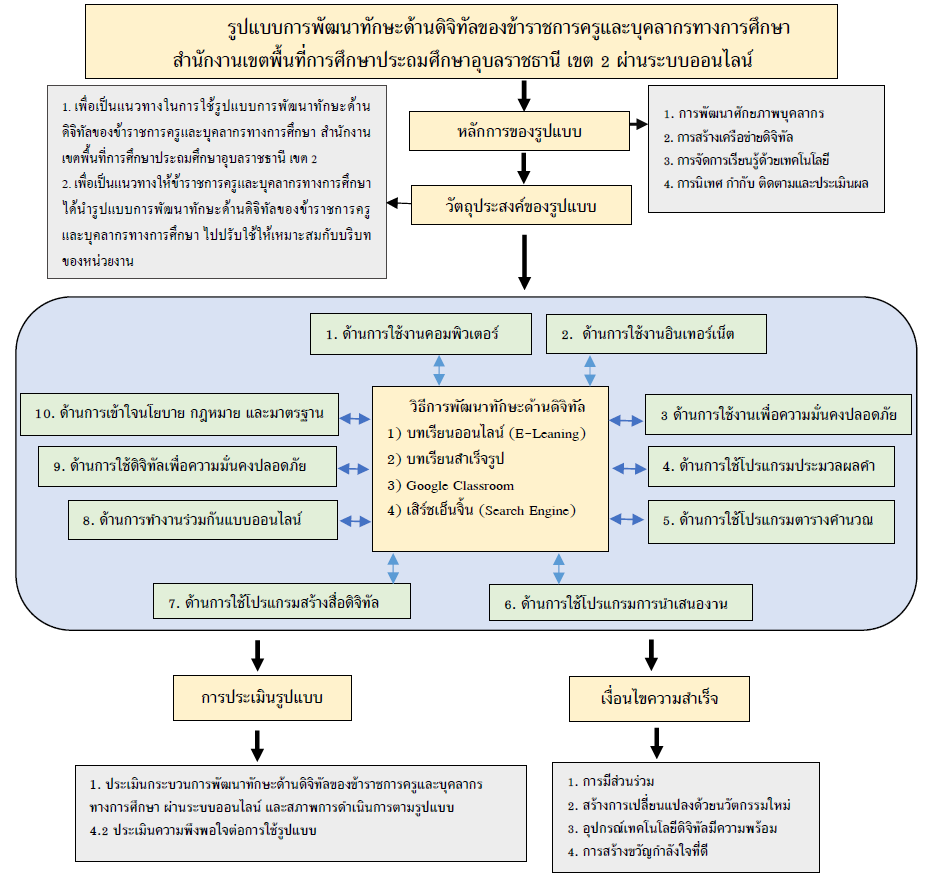Model for developing digital skills of teachers and educational personnel Ubon Ratchathani Primary Educational Service Area Office, Area 2 via the online system
Keywords:
Development, Digital skills, Online systemAbstract
This research aimed to 1) study the basic information and needs for the development of digital skills among civil servant teachers and educational personnel, and 2) create a model for the development of digital skills among civil servant teachers and educational personnel. The research encompassed a combination of research methods, including quantitative and qualitative research. The sample group comprised government teachers and educational personnel from the Ubon Ratchathani Educational Service Area Office, Area 2, totaling 325 people. The research tools used included a questionnaire on needs, a format, a manual for format implementation, and a questionnaire on appropriateness and feasibility. Data analysis involved percentages, means, and standard deviations. The research findings indicated that the need to develop digital skills was generally at a high level. When considering each aspect, it was found that stability of use had the highest average, while the online collaboration section had the lowest average. The digital skills development model consisted of 1) principles of the model, 2) objectives of the model, 3) methods of implementation, 4) evaluation of the model, and 5) conditions for success. The 10 digital skills included 1) computer usage, 2) internet usage, 3) security program usage, 4) word processing program usage, 5) spreadsheet program usage, 6) presentation program usage, 7) digital media creation program usage, 8 ) online collaboration, 9) digital security usage, and 10) understanding policies, laws, and standards. Development methods included 1) online lessons, 2) ready-made lessons, 3) Google Classroom, and 4) search engines. The overall suitability assessment revealed a high level of suitability and the highest level of possibility.
References
กระทรวงศึกษาธิการ. แผนปฏิบัติการดิจิทัลเพื่อการศึกษา กระทรวงศึกษาธิการ พ.ศ. 2563-2565. กระทรวงศึกษาธิการ. กรุงเทพฯ: สำนักงานปลัดกระทรวงศึกษาธิการ; 2564.
สำนักงานปลัดกระทรวงศึกษาธิการ. แผนพัฒนาทักษะด้านดิจิทัลของข้าราชการและบุคลากร สังกัดสำนักงานปลัดกระทรวงศึกษาธิการ พ.ศ. 2562–2565. สำนักงานปลัดกระทรวงศึกษา กระทรวงศึกษาธิการ. กรุงเทพฯ: สำนักอำนวยการ; 2562.
สำนักงานคณะกรรมการดิจิทัลเพื่อเศรษฐกิจและสังคมแห่งชาติ. กรอบสมรรถนะด้านดิจิทัลสำหรับพลเมืองไทย. สำนักงาคณะกรรมการดิจิทัลเพื่อเศรษฐกิจและสังคมแห่งชาติ; 2561.
พิชญ์ สินีมะโน. ผลกระทบจากการเปลี่ยนแปลงในยุค Digital Disruption ต่อการศึกษา The Impact Of Digital Disruption to the Education. วารสารครุศาสตร์อุตสาหกรรม 2562;8:1-6.
ราชกิจานุเบกษา. พระราชบัญญัติการพัฒนาดิจิทัลเพื่อเศรษฐกิจและสังคม พ.ศ. 2560. เล่ม 134 ตอน 30 [อินเตอร์เน็ต]. 2560 [เข้าถึงเมื่อวันที่ 5 ตุลาคม 2564]. เข้าถึงได้จาก http://www.ratchakitcha. soc.go.th.
อัญสุชา บุญขันตินาถ. การพัฒนาทักษะด้านดิจิทัลสำหรับข้าราชการครูและบุคลากรทางการศึกษา. วารสารข้าราชการครูและบุคลากรทางการศึกษา 2561;39:5-8
ล้วน สายยศ และ อังคณา สายยศ. สถิติวิทยาการวิจัย. พิมพ์ครั้งที่ 3. กรุงเทพฯ: สุวิริยาสาสน์; 2540.
สงบ อินทรมณี. การบริหารสถานศึกษาในยุคดิจิทัล. วารสารวิชาการมหาวิทยาลัยการจัดการและเทคโนโลยีอีสเทิร์น 2562;16:353-360.
Kaeophanuek S, Na-Songkhla J. Nilsook P. How to enhance digital literacy skills among information sciences students. International Journal of Information and Education Technology 2018;8:292-7.
ทิพวรรณ โพธิ์ขำ. รูปแบบการบริหารโรงเรียนประชารัฐในยุคดิจิทัล สังกัด สำนักงานคณะกรรมการการศึกษาขั้นพื้นฐาน. วารสาร วิจยวิชาการ 2564;4(1):177-88.
จรัญ น้อยพรหม. รูปแบบการบริหารงานบุคคลที่มีประสิทธิผลของสำนักงานเขตพื้นที่การศึกษาภาคตะวันออกเฉียงเหนือตอนล่าง. วารสารวิชาการมหาวิทยาลัยการจัดการและเทคโนโลยีอีสเทิร์น 2562;16:88-95.

Downloads
Published
Issue
Section
License
บทความทุกบทความที่ตีพิมพ์ในวารสารการพัฒนางานประจำสู่งานวิจัย (JPR2R) ถือว่าเป็นลิขสิทธิ์ของวารสารการพัฒนางานประจำสู่งานวิจัย คณะสิ่งแวดล้อมและทรัพยากรศาสตร์ มหาวิทยาลัยมหิดล





